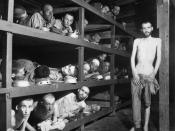People's inhumanity towards other human beings has been a controversial subject in our lives. These events happen and are shown well especially through a catastrophic event such as the Holocaust. In his book, "Night", Elie Wiesel depicts the brutality people face from another. Night is relevant today because by being acquainted with this alarm we will be able to lessen the mistakes we have made in the past. With his father, Wiesel suffers cruelty in his experiences in the concentration camp and through his autobiography we are thus able to see the visions of terrifying horror. Wiesel focuses on the premise of inhumanity at its worst through several events. People engage in inhumanity when they're under stress, for self-preservation, while facing the fragile nature of humanity. These understandings we accumulated will help us to develop ideas to change and modify so that things like war, poverty, prejudice and inhumanity will not exist.
In his autobiography, Night, Wiesel drew out inhumanity by illustrating an image of a woman, Madame Schachter, rather hysterical, versus the Jews around her. When she yells and screams of fire, people around her first sympathize her thinking that she might be thirsty and tries to calm her down. However, as she went on, their "...nerves were at breaking point" (23) and they "...could stand it no longer" (23). This event was significant because not only it foreshadowed what they were going to face, but also because this is the first time Wiesel has experienced such cruelty right in front of him. Same people or their "kind" that they believed in are now the antagonists in this situation. Some Jews say to shut her up because she's not the only one going through this while others try to comfort her but more to "...calm themselves...


